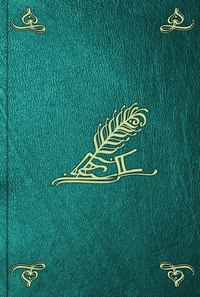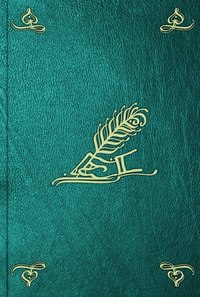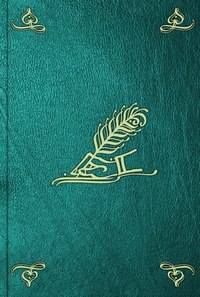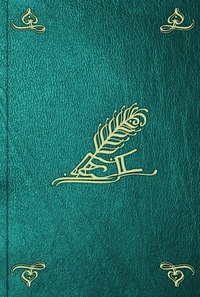 полная версия
полная версияMore Letters of Charles Darwin — Volume 1
I shall be very glad to hear, at some future day, your criticisms on the "causes of variability." Indeed, I feel sure that I am right about sterility and Natural Selection. Two of my grown-up children who are acute reasoners have two or three times at intervals tried to prove me wrong; and when your letter came they had another try, but ended by coming back to my side. I do not quite understand your case, and we think that a word or two is misplaced. I wish some time you would consider the case under the following point of view. If sterility is caused or accumulated through Natural Selection, then, as every degree exists up to absolute barrenness, Natural Selection must have the power of increasing it. Now take two species A and B, and assume that they are (by any means) half-sterile, i.e., produce half the full number of offspring. Now try and make (by Natural Selection) A and B absolutely sterile when crossed, and you will find how difficult it is. I grant, indeed it is certain, that the degree of the sterility of the individuals of A and B will vary; but any such extra-sterile individuals of, we will say A, if they should hereafter breed with other individuals of A, will bequeath no advantage to their progeny, by which these families will tend to increase in number over other families of A, which are not more sterile when crossed with B. But I do not know that I have made this any clearer than in the chapter in my book. It is a most difficult bit of reasoning, which I have gone over and over again on paper with diagrams. (210/1. This letter appeared in "Life and Letters," III., page 80.)
LETTER 211. A.R. WALLACE TO CHARLES DARWIN. March 1st, 1868.
I beg to enclose what appears to me a demonstration on your own principles, that Natural Selection could produce sterility of hybrids. If it does not convince you, I shall be glad if you will point out where the fallacy lies. I have taken the two cases of a slight sterility overcoming perfect fertility, and of a perfect sterility overcoming a partial fertility, — the beginning and end of the process. You admit that variations in fertility and sterility occur, and I think you will also admit that if I demonstrate that a considerable amount of sterility would be advantageous to a variety, that is sufficient proof that the slightest variation in that direction would be useful also, and would go on accumulating.
1. Let there be a species which has varied into two forms, each adapted to existing conditions (211/1. "Existing conditions," means of course new conditions which have now come into existence. And the "two" being both better adapted than the parent form, means that they are better adapted each to a special environment in the same area — as one to damp, another to dry places; one to woods, another to open grounds, etc., etc., as Darwin had already explained. A.R.W. (1899).) better than the parent form, which they supplant.
2. If these two forms, which are supposed to co-exist in the same district, do not intercross, Natural Selection will accumulate favourable variations, till they become sufficiently well adapted to their conditions of life and form two allied species.
3. But if these two forms freely intercross with each other and produce hybrids which are also quite fertile inter se, then the formation of the two distinct races or species will be retarded or perhaps entirely prevented; for the offspring of the crossed unions will be more vigorous owing to the cross, although less adapted to their conditions of life than either of the pure breeds. (211/2. After "pure breeds," add "because less specialised." A.R.W. (1899).)
4. Now let a partial sterility of some individuals of these two forms arise when they intercross; and as this would probably be due to some special conditions of life, we may fairly suppose it to arise in some definite portion of the area occupied by the two forms.
5. The result is that in this area hybrids will not increase so rapidly as before; and as by the terms of the problem the two pure forms are better suited to the conditions of life than the hybrids, they will tend to supplant the latter altogether whenever the struggle for existence becomes severe.
6. We may fairly suppose, also, that as soon as any sterility appears under natural conditions, it will be accompanied by some disinclination to cross-unions; and this will further diminish the production of hybrids.
7. In the other part of the area, however, where hybridism occurs unchecked, hybrids of various degrees will soon far outnumber the parent or pure form.
8. The first result, then, of a partial sterility of crosses appearing in one part of the area occupied by the two forms, will be, that the GREAT MAJORITY of the individuals will there consist of the pure forms only, while in the rest of the area these will be in a minority, — which is the same as saying, that the new sterile or physiological variety of the two forms will be better suited to the conditions of existence than the remaining portion which has not varied physiologically.
9. But when the struggle for existence becomes severe, that variety which is best adapted to the conditions of existence always supplants that which is imperfectly adapted; therefore by Natural Selection the sterile varieties of the two forms will become established as the only ones.
10. Now let a fresh series of variations in the amount of sterility and in the disinclination to crossed unions occur, — also in certain parts of the area: exactly the same result must recur, and the progeny of this new physiological variety again in time occupy the whole area.
11. There is yet another consideration that supports this view. It seems probable that the variations in amount of sterility would to some extent concur with and perhaps depend upon the structural variations; so that just in proportion as the two forms diverged and became better adapted to the conditions of existence, their sterility would increase. If this were the case, then Natural Selection would act with double strength, and those varieties which were better adapted to survive both structurally and physiologically, would certainly do so. (211/3. The preceding eleven paragraphs are substantially but not verbally identical with the statement of the argument in Mr. Wallace's "Darwinism," 1889. Pages 179, 180, note 1.)
12. Let us now consider the more difficult case of two allied species A, B, in the same area, half the individuals of each (As, Bs) being absolutely sterile, the other half (Af, Bf) being partially fertile: will As, Bs ultimately exterminate Af, Bf?
13. To avoid complication, it must be granted, that between As and Bs no cross-unions take place, while between Af and Bf cross-unions are as frequent as direct unions, though much less fertile. We must also leave out of consideration crosses between As and Af, Bs and Bf, with their various approaches to sterility, as I believe they will not affect the final result, although they will greatly complicate the problem.
14. In the first generation there will result: 1st, The pure progeny of As and Bs; 2nd, The pure progeny of Af and of Bf; and 3rd, The hybrid progeny of Af, Bf.
15. Supposing that, in ordinary years, the increased constitutional vigour of the hybrids exactly counterbalances their imperfect adaptations to conditions, there will be in the second generation, besides these three classes, hybrids of the second degree between the first hybrids and Af and Bf respectively. In succeeding generations there will be hybrids of all degrees, varying between the first hybrids and the almost pure types of Af and Bf.
16. Now, if at first the number of individuals of As, Bs, Af and Bf were equal, and year after year the total number continues stationary, I think it can be proved that, while half will be the pure progeny of As and Bs, the other half will become more and more hybridised, until the whole will be hybrids of various degrees.
17. Now, this hybrid and somewhat intermediate race cannot be so well adapted to the conditions of life as the two pure species, which have been formed by the minute adaptation to conditions through Natural Selection; therefore, in a severe struggle for existence, the hybrids must succumb, especially as, by hypothesis, their fertility would not be so great as that of the two pure species.
18. If we were to take into consideration the unions of As with Af and Bs with Bf, the results would become very complicated, but it must still lead to there being a number of pure forms entirely derived from As and Bs, and of hybrid forms mainly derived from Af and Bf; and the result of the struggle of these two sets of individuals cannot be doubtful.
19. If these arguments are sound, it follows that sterility may be accumulated and increased, and finally made complete by Natural Selection, whether the sterile varieties originate together in a definite portion of the area occupied by the two species, or occur scattered over the whole area. (211/4. The first part of this discussion should be considered alone, as it is both more simple and more important. I now believe that the utility, and therefore the cause of sterility between species, is during the process of differentiation. When species are fully formed, the occasional occurrence of hybrids is of comparatively small importance, and can never be a danger to the existence of the species. A.R.W. (1899).)
P.S. — In answer to the objection as to the unequal sterility of reciprocal crosses ("Variation, etc." Volume II., page 186) I reply that, as far as it went, the sterility of one cross would be advantageous even if the other cross was fertile: and just as characters now co-ordinated may have been separately accumulated by Natural Selection, so the reciprocal crosses may have become sterile one at a time.
LETTER 212. TO A.R. WALLACE. 4, Chester Place, March 17th, 1868.
(212/1. Mr. Darwin had already written a short note to Mr. Wallace expressing a general dissent from his view.)
I do not feel that I shall grapple with the sterility argument till my return home; I have tried once or twice, and it has made my stomach feel as if it had been placed in a vice. Your paper has driven three of my children half mad — one sat up till 12 o'clock over it. My second son, the mathematician, thinks that you have omitted one almost inevitable deduction which apparently would modify the result. He has written out what he thinks, but I have not tried fully to understand him. I suppose that you do not care enough about the subject to like to see what he has written.
LETTER 212A. A.R. WALLACE TO CHARLES DARWIN. Hurstpierpoint, March, 24th {1868}.
I return your son's notes with my notes on them. Without going into any details, is not this a strong general argument?
1. A species varies occasionally in two directions, but owing to their free intercrossing the varieties never increase.
2. A change of conditions occurs which threatens the existence of the species; but the two varieties are adapted to the changing conditions, and if accumulated will form two new species adapted to the new conditions.
3. Free crossing, however, renders this impossible, and so the species is in danger of extinction.
4. If sterility would be induced, then the pure races would increase more rapidly, and replace the old species.
5. It is admitted that partial sterility between varieties does occasionally occur. It is admitted {that} the degree of this sterility varies; is it not probable that Natural Selection can accumulate these variations, and thus save the species? If Natural Selection can NOT do this, how do species ever arise, except when a variety is isolated?
Closely allied species in distinct countries being sterile is no difficulty; for either they diverged from a common ancestor in contact, and Natural Selection increased the sterility, or they were isolated, and have varied since: in which case they have been for ages influenced by distinct conditions which may well produce sterility.
If the difficulty of grafting was as great as the difficulty of crossing, and as regular, I admit it would be a most serious objection. But it is not. I believe many distinct species can be grafted, while others less distinct cannot. The regularity with which natural species are sterile together, even when very much alike, I think is an argument in favour of the sterility having been generally produced by Natural Selection for the good of the species.
The other difficulty, of unequal sterility of reciprocal crosses, seems none to me; for it is a step to more complete sterility, and as such would be increased by selection.
LETTER 213. TO A.R. WALLACE. Down, April 6th {1868}.
I have been considering the terrible problem. Let me first say that no man could have more earnestly wished for the success of Natural Selection in regard to sterility than I did; and when I considered a general statement (as in your last note) I always felt sure it could be worked out, but always failed in detail. The cause being, as I believe, that Natural Selection cannot effect what is not good for the individual, including in this term a social community. It would take a volume to discuss all the points, and nothing is so humiliating to me as to agree with a man like you (or Hooker) on the premises and disagree about the result.
I agree with my son's argument and not with the rejoinder. The cause of our difference, I think, is that I look at the number of offspring as an important element (all circumstances remaining the same) in keeping up the average number of individuals within any area. I do not believe that the amount of food by any means is the sole determining cause of number. Lessened fertility is equivalent to a new source of destruction. I believe if in one district a species produced from any cause fewer young, the deficiency would be supplied from surrounding districts. This applies to your Paragraph 5. (213/1. See Letter 211.) If the species produced fewer young from any cause in every district, it would become extinct unless its fertility were augmented through Natural Selection (see H. Spencer).
I demur to probability and almost to possibility of Paragraph 1., as you start with two forms within the same area, which are not mutually sterile, and which yet have supplanted the parent-form.
(Paragraph 6.) I know of no ghost of a fact supporting belief that disinclination to cross accompanies sterility. It cannot hold with plants, or the lower fixed aquatic animals. I saw clearly what an immense aid this would be, but gave it up. Disinclination to cross seems to have been independently acquired, probably by Natural Selection; and I do not see why it would not have sufficed to have prevented incipient species from blending to have simply increased sexual disinclination to cross.
(Paragraph 11.) I demur to a certain extent to amount of sterility and structural dissimilarity necessarily going together, except indirectly and by no means strictly. Look at vars. of pigeons, fowls, and cabbages.
I overlooked the advantage of the half-sterility of reciprocal crosses; yet, perhaps from novelty, I do not feel inclined to admit probability of Natural Selection having done its work so queerly.
I will not discuss the second case of utter sterility, but your assumptions in Paragraph 13 seem to me much too complicated. I cannot believe so universal an attribute as utter sterility between remote species was acquired in so complex a manner. I do not agree with your rejoinder on grafting: I fully admit that it is not so closely restricted as crossing, but this does not seem to me to weaken the case as one of analogy. The incapacity of grafting is likewise an invariable attribute of plants sufficiently remote from each other, and sometimes of plants pretty closely allied.
The difficulty of increasing the sterility through Natural Selection of two already sterile species seems to me best brought home by considering an actual case. The cowslip and primrose are moderately sterile, yet occasionally produce hybrids. Now these hybrids, two or three or a dozen in a whole parish, occupy ground which might have been occupied by either pure species, and no doubt the latter suffer to this small extent. But can you conceive that any individual plants of the primrose and cowslip which happened to be mutually rather more sterile (i.e. which, when crossed, yielded a few less seed) than usual, would profit to such a degree as to increase in number to the ultimate exclusion of the present primrose and cowslip? I cannot.
My son, I am sorry to say, cannot see the full force of your rejoinder in regard to second head of continually augmented sterility. You speak in this rejoinder, and in Paragraph 5, of all the individuals becoming in some slight degree sterile in certain districts: if you were to admit that by continued exposure to these same conditions the sterility would inevitably increase, there would be no need of Natural Selection. But I suspect that the sterility is not caused so much by any particular conditions as by long habituation to conditions of any kind. To speak according to pangenesis, the gemmules of hybrids are not injured, for hybrids propagate freely by buds; but their reproductive organs are somehow affected, so that they cannot accumulate the proper gemmules, in nearly the same manner as the reproductive organs of a pure species become affected when exposed to unnatural conditions.
This is a very ill-expressed and ill-written letter. Do not answer it, unless the spirit urges you. Life is too short for so long a discussion. We shall, I greatly fear, never agree.
LETTER 214. A.R. WALLACE TO CHARLES DARWIN. Hurstpierpoint, {April?} 8th, 1868.
I am sorry you should have given yourself the trouble to answer my ideas on sterility. If you are not convinced, I have little doubt but that I am wrong; and, in fact, I was only half convinced by my own arguments, and I now think there is about an even chance that Natural Selection may or may not be able to accumulate sterility. If my first proposition is modified to the existence of a species and a variety in the same area, it will do just as well for my argument. Such certainly do exist. They are fertile together, and yet each maintains itself tolerably distinct. How can this be, if there is no disinclination to crossing?
My belief certainly is that number of offspring is not so important an element in keeping up population of a species as supply of food and other favourable conditions; because the numbers of a species constantly vary greatly in different parts of its own area, whereas the average number of offspring is not a very variable element.
However, I will say no more, but leave the problem as insoluble, only fearing that it will become a formidable weapon in the hands of the enemies of Natural Selection.
LETTER 215. TO J.D. HOOKER.
(215/1. The following extract from a letter to Sir Joseph Hooker (dated April 3rd, 1868) refers to his Presidential Address for the approaching meeting of the British Association at Norwich.
Some account of Sir Joseph's success is given in the "Life and Letters," III., page 100, also in Huxley's "Life," Volume I., page 297, where Huxley writes to Darwin: —
"We had a capital meeting at Norwich, and dear old Hooker came out in great force, as he always does in emergencies. The only fault was the terrible 'Darwinismus' which spread over the section and crept out when you least expected it, even in Fergusson's lecture on 'Buddhist Temples.' You will have the rare happiness to see your ideas triumphant during your lifetime.
"P.S. — I am going into opposition; I can't stand it.")
Down, April 3rd {1868}.
I have been thinking over your Presidential Address; I declare I made myself quite uncomfortable by fancying I had to do it, and feeling myself utterly dumbfounded.
But I do not believe that you will find it so difficult. When you come to Down I shall be very curious to hear what your ideas are on the subject.
Could you make anything out of a history of the great steps in the progress of Botany, as representing the whole of Natural History? Heaven protect you! I suppose there are men to whom such a job would not be so awful as it appears to me...If you had time, you ought to read an article by W. Bagehot in the April number of the "Fortnightly" (215/2. "Physic and Politics," "Fortnightly Review," Volume III., page 452, 1868.), applying Natural Selection to early or prehistoric politics, and, indeed, to late politics, — this you know is your view.
LETTER 216. A.R. WALLACE TO CHARLES DARWIN. 9, St. Mark's Crescent, N.W., August 16th {1868}.
I ought to have written before to thank you for the copies of your papers on Primula and on "Cross-unions of Dimorphic Plants, etc." The latter is particularly interesting and the conclusion most important; but I think it makes the difficulty of how these forms, with their varying degrees of sterility, originated, greater than ever. If "natural selection" could not accumulate varying degrees of sterility for the plant's benefit, then how did sterility ever come to be associated with one cross of a trimorphic plant rather than another? The difficulty seems to be increased by the consideration that the advantage of a cross with a distinct individual is gained just as well by illegitimate as by legitimate unions. By what means, then, did illegitimate unions ever become sterile? It would seem a far simpler way for each plant's pollen to have acquired a prepotency on another individual's stigma over that of the same individual, without the extraordinary complication of three differences of structure and eighteen different unions with varying degrees of sterility!
However, the fact remains an excellent answer to the statement that sterility of hybrids proves the absolute distinctness of the parents.
I have been reading with great pleasure Mr. Bentham's last admirable address (216/1. "Proc. Linn. Soc." 1867-8, page lvii.), in which he so well replies to the gross misstatements of the "Athenaeum;" and also says award in favour of pangenesis. I think we may now congratulate you on having made a valuable convert, whose opinions on the subject, coming so late and being evidently so well considered, will have much weight.
I am going to Norwich on Tuesday to hear Dr. Hooker, who I hope will boldly promulgate "Darwinism" in his address. (216/2. Sir Joseph Hooker's Presidential Address at the British Association Meeting.) Shall we have the pleasure of seeing you there?
I am engaged in negociations about my book.
Hoping you are well and getting on with your next volumes.
(216/3. We are permitted by Mr. Wallace to append the following note as to his more recent views on the question of Natural Selection and sterility: —
"When writing my "Darwinism," and coming again to the consideration of this problem of the effect of Natural Selection in accumulating variations in the amount of sterility between varieties or incipient species twenty years later, I became more convinced, than I was when discussing with Darwin, of the substantial accuracy of my argument. Recently a correspondent who is both a naturalist and a mathematician has pointed out to me a slight error in my calculation at page 183 (which does not, however, materially affect the result), disproving the 'physiological selection' of the late Dr. Romanes, but he can see no fallacy in my argument as to the power of Natural Selection to increase sterility between incipient species, nor, so far as I am aware, has any one shown such fallacy to exist.
"On the other points on which I differed from Mr. Darwin in the foregoing discussion — the effect of high fertility on population of a species, etc. — I still hold the views I then expressed, but it would be out of place to attempt to justify them here."
A.R.W. (1899).)
LETTER 217. TO C. LYELL. Down, October 4th {1867}.
With respect to the points in your note, I may sometimes have expressed myself with ambiguity. At the end of Chapter XXIII., where I say that marked races are not often (you omit "often") produced by changed conditions (217/1. "Hence, although it must be admitted that new conditions of life do sometimes definitely affect organic beings, it may be doubted whether well-marked races have often been produced by the direct action of changed conditions without the aid of selection either by man or nature." ("Animals and Plants," Volume II., page 292, 1868.)), I intended to refer to the direct action of such conditions in causing variation, and not as leading to the preservation or destruction of certain forms. There is as wide a difference in these two respects as between voluntary selection by man and the causes which induce variability. I have somewhere in my book referred to the close connection between Natural Selection and the action of external conditions in the sense which you specify in your note. And in this sense all Natural Selection may be said to depend on changed conditions. In the "Origin" I think I have underrated (and from the cause which you mention) the effects of the direct action of external conditions in producing varieties; but I hope in Chapter XXIII. I have struck as fair a balance as our knowledge permits.









